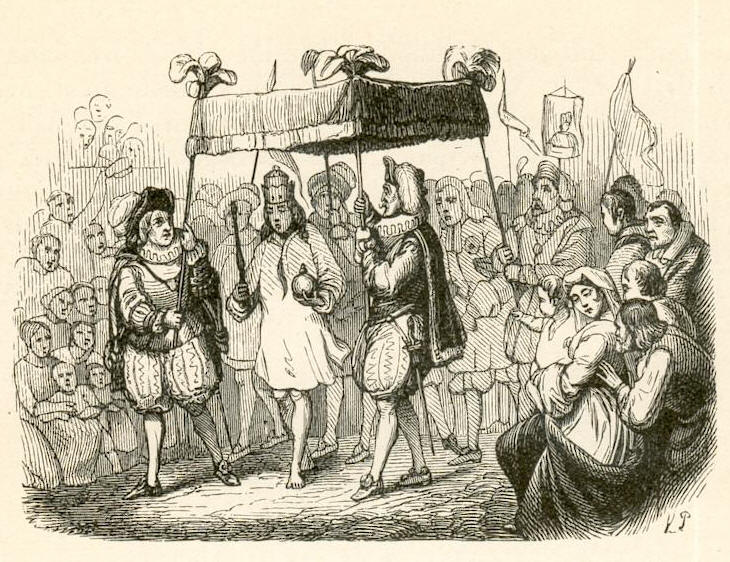Today, 2 November, is All Souls' Day, a holy day in the western Christian calendar.
We may be familiar with churches being called "All Souls", one of the most famous being the one on Langham Place within sight of the BBC Centre.
So what's the difference between 'saints' and 'souls'? In a sentence, the saints have already made it while the souls are still on their way... in purgatory (what has been called the "Church Penitent"). The theology of it all is rather abysmal, but, thinking out loud, I wonder if it can be 'redeemed' (pun intended). Purgatory is one of those doctrines which sneaked (snuck?) its way into the Christian faith starting in the Middle Ages. For many years it was a bone of contention between West and East, although Eastern Orthodox Christianity has a comparable notion of post-death testing: the so-called aerial toll-houses.
The Biblical 'basis' of these doctrines is to be found in 1 Corinthians 3 - "saved through fire". Allegedly it is in a post-death fire that the soul is prepared for glory.
This notion of 'fire' provides a helpful bridge for a redemption of this concept. Fire is indeed purifying and is referenced in other texts such as in 1 Peter 4:17 to refer to believers' earthly cross-like trials, even judgments, preparing the people of God for glory. And they do so, not on account of our own merit or effort or suffering, but because of our participation in the saving merit, effort and suffering of the Saviour - crucifed and risen, suffering and glorified.
So what I would suggest is this.
1 November reminds us of the Church Triumphant, the saints - all of them - from Abel to Zachariah, from righteous Stephen to compromised Lot, from the brightest example of Christian faith you can think of to the weakest brother or sister with all their failings who we nevertheless trust is in glory. In Christ we are all saints, departing this life flawed and mortal and instantly entering the glory of our heavenly dwelling, the object of Christian confidence not merely aspiration (Luke 23:43; Philippians 1:23, 2 Corinthians 5:3).
And 2 November reminds us of the souls, those still on their way, to each one of us down here, the Church Militant, whose daily prayer is, "lead us not into temptation but deliver us from evil", each undergoing our fiery trials and each experiencing in the midst of them the sufficient grace of God in Christ.
We may be familiar with churches being called "All Souls", one of the most famous being the one on Langham Place within sight of the BBC Centre.
So what's the difference between 'saints' and 'souls'? In a sentence, the saints have already made it while the souls are still on their way... in purgatory (what has been called the "Church Penitent"). The theology of it all is rather abysmal, but, thinking out loud, I wonder if it can be 'redeemed' (pun intended). Purgatory is one of those doctrines which sneaked (snuck?) its way into the Christian faith starting in the Middle Ages. For many years it was a bone of contention between West and East, although Eastern Orthodox Christianity has a comparable notion of post-death testing: the so-called aerial toll-houses.
The Biblical 'basis' of these doctrines is to be found in 1 Corinthians 3 - "saved through fire". Allegedly it is in a post-death fire that the soul is prepared for glory.
This notion of 'fire' provides a helpful bridge for a redemption of this concept. Fire is indeed purifying and is referenced in other texts such as in 1 Peter 4:17 to refer to believers' earthly cross-like trials, even judgments, preparing the people of God for glory. And they do so, not on account of our own merit or effort or suffering, but because of our participation in the saving merit, effort and suffering of the Saviour - crucifed and risen, suffering and glorified.
So what I would suggest is this.
1 November reminds us of the Church Triumphant, the saints - all of them - from Abel to Zachariah, from righteous Stephen to compromised Lot, from the brightest example of Christian faith you can think of to the weakest brother or sister with all their failings who we nevertheless trust is in glory. In Christ we are all saints, departing this life flawed and mortal and instantly entering the glory of our heavenly dwelling, the object of Christian confidence not merely aspiration (Luke 23:43; Philippians 1:23, 2 Corinthians 5:3).
And 2 November reminds us of the souls, those still on their way, to each one of us down here, the Church Militant, whose daily prayer is, "lead us not into temptation but deliver us from evil", each undergoing our fiery trials and each experiencing in the midst of them the sufficient grace of God in Christ.





















